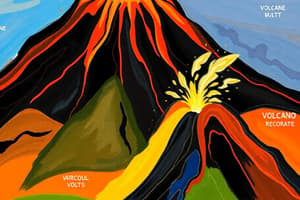Podcast
Questions and Answers
What characterizes fissure volcanoes?
What characterizes fissure volcanoes?
- They produce lava fountains.
- They have a central crater.
- They form from large cracks in the ground. (correct)
- They erupt from multiple openings.
Which of the following is a feature of cinder cone volcanoes?
Which of the following is a feature of cinder cone volcanoes?
- They have steep sides and a bowl-shaped crater. (correct)
- They erupt from multiple vents.
- They are usually taller than 10,000 feet.
- They primarily consist of solidified lava flows.
What type of volcano is typically formed from layers of lava, ash, and cinders?
What type of volcano is typically formed from layers of lava, ash, and cinders?
- Shield volcano
- Fissure volcano
- Composite volcano (correct)
- Cinder cone volcano
Which type of volcano is characterized by gentle slopes and a flat, rounded top?
Which type of volcano is characterized by gentle slopes and a flat, rounded top?
Which volcano is an example of a cinder cone volcano?
Which volcano is an example of a cinder cone volcano?
What is a distinguishing feature of composite volcanoes compared to other types?
What is a distinguishing feature of composite volcanoes compared to other types?
Which of the following factors typically influences the size of shield volcanoes?
Which of the following factors typically influences the size of shield volcanoes?
Which volcano mentioned is the largest single mountain in the world?
Which volcano mentioned is the largest single mountain in the world?
How do fissure volcanoes typically differ in appearance from other types of volcanoes?
How do fissure volcanoes typically differ in appearance from other types of volcanoes?
What is the main danger associated with composite volcanoes?
What is the main danger associated with composite volcanoes?
Flashcards are hidden until you start studying
Study Notes
Fissure Volcanoes
- Fissure volcanoes erupt from long cracks in the Earth's surface
- Lava flows from these cracks over large areas, forming flat lava fields
- The source of the fissures is usually buried underground
- An example is the 1952 eruption at Los Pilas volcano in Nicaragua
Cinder Cone Volcanoes
- Cinder cones are small, cone-shaped volcanoes with a bowl-shaped crater
- They are formed by the accumulation of volcanic ash, cinders, and lava fragments
- They usually erupt from a single vent
- Examples include Paricutin in Mexico and a cinder cone in Crater Lake, Oregon
Composite Volcanoes
- Also known as stratovolcanoes, they are tall, steep-sided volcanoes with symmetrical shapes
- They are composed of alternating layers of lava, ash, and cinders
- They can reach heights of up to 10,000 feet
- Famous composite volcanoes include Mount Fuji, Mount Shasta, Mount Lassen, Mount St. Helens, Mount Rainier, Mount Hood, and Mount Etna
Shield Volcanoes
- Shield volcanoes are large, gently sloping volcanoes with flat, rounded tops
- They are formed by repeated eruptions of fluid lava that spreads over large areas
- They typically have a large crater at their summit
- Examples include Mauna Loa, Kilauea, and Olympus Mons on Mars
Key Facts
- Shield volcanoes are the largest type of volcano
- Fissure volcanoes are the least common type of volcano
- Composite volcanoes are the most dangerous type of volcano
- Mauna Loa in Hawaii is the largest single mountain in the world
- Olympus Mons on Mars is the largest volcano in the solar system
Studying That Suits You
Use AI to generate personalized quizzes and flashcards to suit your learning preferences.




